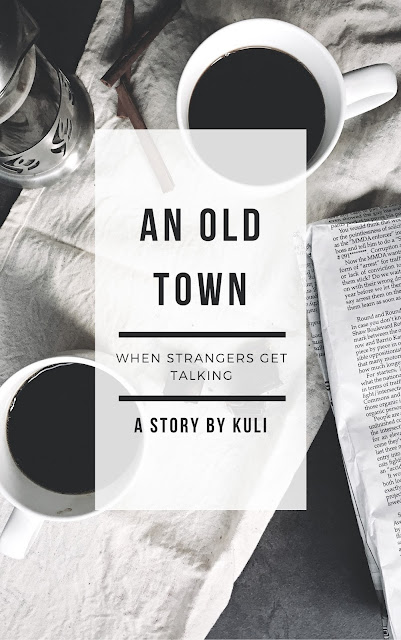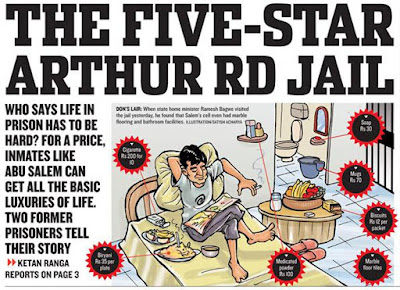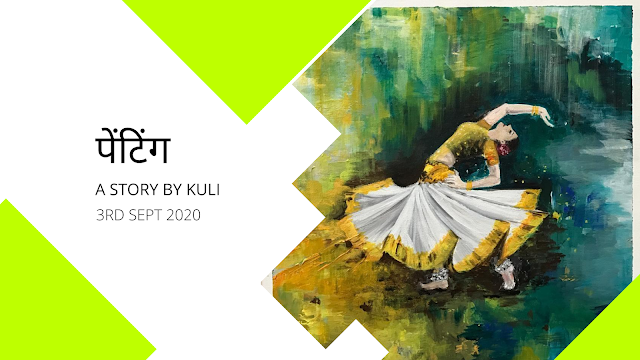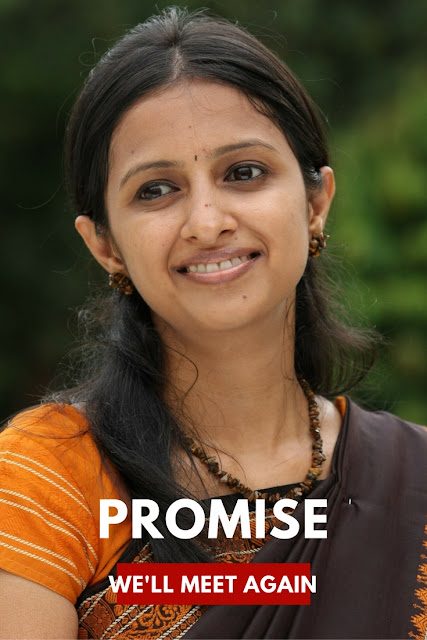An Old Town
I had no
intention of spending my time here at the coffee house. I hate nostalgia, it
makes me miserable as hell. I am pulled by opposing emotions. I am happy and sad.
I am happy because
I am once again at a place where I had spent some time of my life and I am sad
because that time is not going to come back ever. I am relieved that no one now
knows me, but I still keep looking for a familiar face in the crowd like a lover
looks for his beloved. I look like a madman lost and then someone asks.
"Are you
new to this place?" She looks like she is the owner of the café. She is young and fresh and looks a bit bored.
I say "Yes"
"Neither"
I say
"You
look like you are lost"
"I
am"
"Where
do you want to go?"
To stop the
barrage of questions I say - “Can I get a cup of black filter coffee?"
"Sure,
sure come in"
All the while
she is intently looking at my face and as my coffee arrives she probes again
"You look familiar"
"I get a
lot of that. Just a common face I guess"
"Are you
a ghost?"
Now her question
intrigues me. "Do you believe in ghosts?" I ask.
"Not as
a rule. But I can make an exception in this case. You look like one, like you
are possessed. Like you are from the past" she says with a chuckle.
"Oh I am
very much here! Only I am sitting on that table 30 years back with my wife and
sipping coffee, she was my girlfriend then. This place was different then; much
smaller. The place looks new like I don't know it anymore. I am sure you
weren't even born then"
"So i
was right. You are possessed by the ghost of the past" she says
triumphantly.
"Ghost?
- No; a Soul - Yes. What you call it in
urdru - ha yes! – रूह "
"What is
the difference?" she asks pulling a chair to my table.
"जो सुकून दे वह रूह है" I say evoking the shayar in me (One that gives peace)
"And
Ghost?"
"शायद, जो बेचैन कर दे” (one that perturbs)
She looks at
me with questioning eyes. I realize I must have given her a bouncer. I quickly
finish my coffee in silence and as I am getting up from the chair I say -
"So this
is my curse. I am overtly emotional about past and stupidly philosophical about
it. And now as I am nearing 50, a constant nostalgia always jingles in my
pocket"
"Would
you like to tell me your story?" she asks looking me in my eyes. I am
surprised by the confrontation. It is more of a demand than a request but the
lady looks like she really wants me to talk.
I have
nothing else do but I am not open to being vulnerable today, at least not to a
stranger. Thus I shrug my shoulder and say "There is no story. I have
nothing to tell"
"There
is always a story. In the end that is what we really become……..A Story.
Please…." she says squeezing my hand. This time she is gentler.
I sit down.
She gestures to someone and two black coffee and some brownies are delivered to
the table. I realize that the café is almost vacant and thus I begun
My Dad was a
government servant which meant transfers were inevitable. It took me 5 schools
and 2 colleges to complete my graduation and took me to 8 different places in a
span of 21 years of my early life - some towns, few cities and a village. To
some it might be a painful experience to leave one's school, friends and a set
routine and start it all over again; but I liked the whole exercise. Partings
were always painful but the excitement of something new was equally alluring. I
always liked the newness of things and that included the smell of the new
raincoat and of the new school bag, the new text books, new uniform, new shoes
and above all - New friends. So new
place meant letters to friends in old towns describing the new school, the new
colony and new friends and lots of comparisons. Almost always it was the old
place that was voted better in such exchanges - past memories are always better
than the present. While the old friends told us how much they missed us all (us
3 siblings) and how the new family that is now residing in our quarter is a
bore. So in all these years I have met, seen and befriended many. Some are
still friends, a lot have been forgotten and some others do cross roads once in
a while - at least in memories.
The frequent
transfers have taught me to treasure memories because that was all that I could
carry with me. Oh! How much I would have loved to carry some friends, trees and
roads with me. But I have no qualms about the physical limitations. My vivid
memory serves me just the same.
Let me pull out
a year from my time at a beautiful place where I and Dad were alone. The place
was Barham Wadi a small British Cantonment town down south of Wardha in
Maharashtra. The water works department quarter was situated at the outskirts
of Wadi and I and Dad were alone at the beautiful hillock area near to where
the filtration plant was situated. He was summoned as the Chief Engineer to
overlook commissioning of a modern filtration plant that would multiply the
existing capacity by 20 times. Those were the 70's decade and the
post-independence day of vigor and hope were all lost. But dedicated engineers
like my father were giving all they could in the process of nation building.
This meant that he was transferred to far off places and we would gather our meager belongings and reach new places every once in a while. But this time
around the posting in Wadi was meant to last for a year only and my sisters
were due to go to college. Thus my parents thought it would be wise to let us three,
along with our mother, to stay at our Nani’s place in Bhopal instead. Bhopal
was a bigger town and offered better education. I was but adamant and wanted to
go to Wadi. I was still in 8th standard and I argued that father will need some
company and after all it was just a matter of less than a year. Thus it was
decided that me, dad and Sitaram, my grandparent's man servant and cook, will
go to Wadi.
Sitaram was a
short, baldy guy with a pot belly that looked like a hydrogen balloon. He wore
a white dhoti and a white shirt all the time. He spoke crude Awadhi, cooked
pleasant Awadhi and was always vigilant about my actions - direct orders from
my Nani. I liked him for his cooking and hated him for being a constant watch
over me. But I knew well to evade his watchful eyes. All my life I despised
authority and rebelled at the first sign of resistance. Wadi was my first taste
of freedom and I was not going to let Sitaram spoil it.
Wadi was
different than any other place I had been before. It was secluded and
beautiful. The town had a sleepy railway
station that came to life at 5 am and 4 pm with only two trains passing at
those two hours. The cantonment area was a good distance away from the main
town. Exquisite Victorian architecture like a church, a post office and a court
room that dotted the single major street of the town gave it a very quaint
look. But as like any other town, Wadi too had the new tinned and concrete
structure that mushroomed like wild vegetation with each passing year giving it
a look of a lady that once was beautiful but now was suffering from some
terrible skin ailment. Father's quarters, were further north of the cantonment
area making us the people who stayed farthest from the main market near the
station. The colony had only 2 officer's quarters and 6 worker's quarter on a
small hill adjacent to the old filtration plant. This was a high point and you
could look down at the running railway tracks, the sleepy dusty town and all
its myriad people and the cantonment area from up here like a hawk. The hill at
the back descended into a gorge and then rose again into another one that was
almost double the size of this one. This bigger hill was rumoured to be haunted
and thus had a dense forest growing a top it. A small steam ran in between the
hills during rainy season.
I liked Wadi
but I terribly missed any human company for a friend. The trees and vegetation
and the thousands of birds and animals were my new friends, all because there
wasn't a single sole in the colony I could play with. School too was a far off
affair and almost all students stayed near the main market. All boys and girls at school were nice and
friendly but none were to be my friends. I had to travel on feet 2.5 kilometer every day to reach the St. Lawrence Convent School which was located inside the
cantonment area. The school was a built in 1904 and was inaugurated by the then
Governor of the C P and Berar Province Sir John Prescott Hewett. Everything about it was huge - the
classrooms, the prayer hall, the library and the ground. And since the number
of pupils were thin it looked even bigger and the red brick structure and a
bust of King Edward VII in the middle looked condescending.
Wadi offered me
unrestricted access to my hearts will. With dad missing for a good part of the
day and school getting over by early afternoon I had a huge day to kill my time
and explore the adventure on the hills. When we reached Wadi the monsoon had
just begun. I roamed all around the town and the containment area and the
colony and the hills with my freedom and the new found carefreeness. But
without any fellow to partake in my fun it all became mundane very soon. But
then the rain finally stopped and in came the huts of the construction workers.
One day while I
was returning from the school I noticed a lot of tents being set up on the open
space near the filtration system. The
dirty mud soaked canvasses, worn out tin sheets, the ropes, the bamboos
and a whole lot of men were busy putting up their new shelter in place. A week
or so hence there were families, dark looking ladies and girls and naked small
boys. The construction of the new water plant was about to commence and
suddenly there was a lot of movement and noise in the peaceful colony of ours,
much to my relief. I looked at the new people with amusement. They were really
different. They spoke a very different language and their attire was strange.
The men all wore loin cloths and nothing else while the ladies wore colourful
dresses and adorned large circular ring as necklaces and nose and ear rings.
The small babies were mostly naked. There was but one thing common that they
all wore despite their hard life and it was a beaming smile. The striking
poverty was very visible but strangely it wasn't pitiable. All along the day
the men were busy at work but as the evening descended the gathering at the
huts grew thick and clamorous. The men played games while the ladies sang song
and prepared simple but nice smelling food on the smoky chullhas. They
possessed nothing and they ate and slept under the sky but they behaved like
they owned the stars and the moon and the river. From the perspective of a
modern life they had all the reasons to be worried but they were blithe. If a
famine struck they would be the first casualties but they were opulent in sharing.
I think that is what drew me to them and though I remained an outsider I very
much became a part of them in some small sort of way and their presence was a
new learning for me. That year I learnt more from them about the world than at
school. They taught me to make simple and useful weapons to catch snakes and as
protection from the intruders - like a wooden sickle. I learnt to play Gudu, Kabadi,
Kelibadi and Nadia Phinga (Coconut
Throwing) from the Bhainas. I learnt to eat and like Pakhala, Dalma and Besara
and even had my first taste of Mahua, a freshly brewed liquor made of butter
tree flowers, with them.
Sitaram didn’t
like me mingling with the workers. He was a firm believer in the caste system,
and though we were not the high caste Bramhins, he firmly believed that we were
superior to the workers. He had his own doubts that they were untouchables, but
the fact that my father never stopped me mingling with them made him believe
otherwise. My father was a liberal and belonged to the new generation of
Indians who valued education and equality. He was never the strict type and
would never stop us children from anything as long as we were open to him. But
that did not stop Sitaram from complaining to my father, who was getting more
and more busy at office and started coming late in the evening.
Thus I started
spending more and more time with the families of the workers. I believe that I
owe my predilection to folk music to them. With nothing but an ektara and a
small dholak they created magic. They danced in formations and moved about in
circles raising the dust and the spirit of an onlooker. They gave me my wealth
of music, my culinary skills and my spirituality. I never saw them fight or
treat anyone (be it a woman or a child or a dog) with disrespect and thus they
also gave me a new meaning for being educated. They had a very earthy way of
living, one that was in sync with nature. They were hardworking, honest and
responsible men. Time flew fast and they completed the work of the water plant
on time and then it was time for them to leave.
Just days ahead
of Holi the huts and the workers were gone. While they were leaving I cried.
Never in my entire life had I felt so abandoned before. I guess the feeling of
helplessness was what caused my inner upheaval. Helplessness that this is last
time that I am going to see them - that I was never going to meet them again
nor would I be able to be in touch with them through letters. That day I
realised what an evil thing hope is - if you have it, you suffer now looking at
tomorrow and if you don't have it, you suffer now knowing there is no tomorrow
- thing is you suffer anyway.
After they
left I felt a sudden empty cavity in the pit of my stomach. They had taken
every sign of their existence with them. The tent, the chullhas, and the
laughter- all was gone. It was as if they were never there except in my mind
and hence it was upsetting. Each time I looked at the vacant plot where once
the huts were my heart filled up and trickled down from my eyes. Parting with
those workers stirred something from deep within me. This was definitely not
the first time I was saying goodbye to someone but it definitely was the last
time when I said a goodbye with a happy face. I reckon that was the day when I
began suffering from Perennial Nostalgic Syndrome - you see I am hypochondriac
too, I create my own ailments.
The workers
left without any farewell and I felt really miserable till I too finally left
Wadi a couple of months later. I have never sent any letter to anyone in Wadi
and have never been to Wadi again after that. I am not a psychologist but I
think the time I spent in Wadi and the separation I experienced has got something
to do with why I don't like nostalgia.
I reckon, it
was my first experience with death. But this realisation came decades later when
I lost my partner of 20 years. That day I again felt the empty cavity return but
this time it never went away. Since that day I started looking more often than
necessary in the past; questioning if God truly has any plans for us. All my
life, as I look it from here, seems like a series of random incidences and I have
lost any faith I had in anything good in the world. Then when I thought I had
lost it all I got my poetry. Strange is his ways. He takes away what we want
and gives us whatever he thinks fit and since we can't do anything about it, we
- the resilient human make the best of whatever we get and then people come
along and tell us - See he takes care of everything. But my beliefs keep
changing these days and if we were to meet again some other day who knows I might
be praising God and his ways but as of today I don’t think we live a plan, we simply follow a custom of living and the habit of breathing till …….
And I hear
her say
ज़िन्दगी जीना भी क्या रवायत है
सांस लेना भी क्या आदत है
चलती रही साँसें और मैं ज़िंदा रहा
मैं ज़िंदा हु - मैं ज़िंदा हु कहता रहा
फिर एक दिन जब डॉक्टर ने कहा -
"इनका बचाना मुश्किल है "
तब एहसाँस हुआ
थोड़ा मरना अभी और बाकि है
And we both
laugh and laugh and laugh.
"See i said you look familiar" she says smiling at me.










Comments
Post a Comment